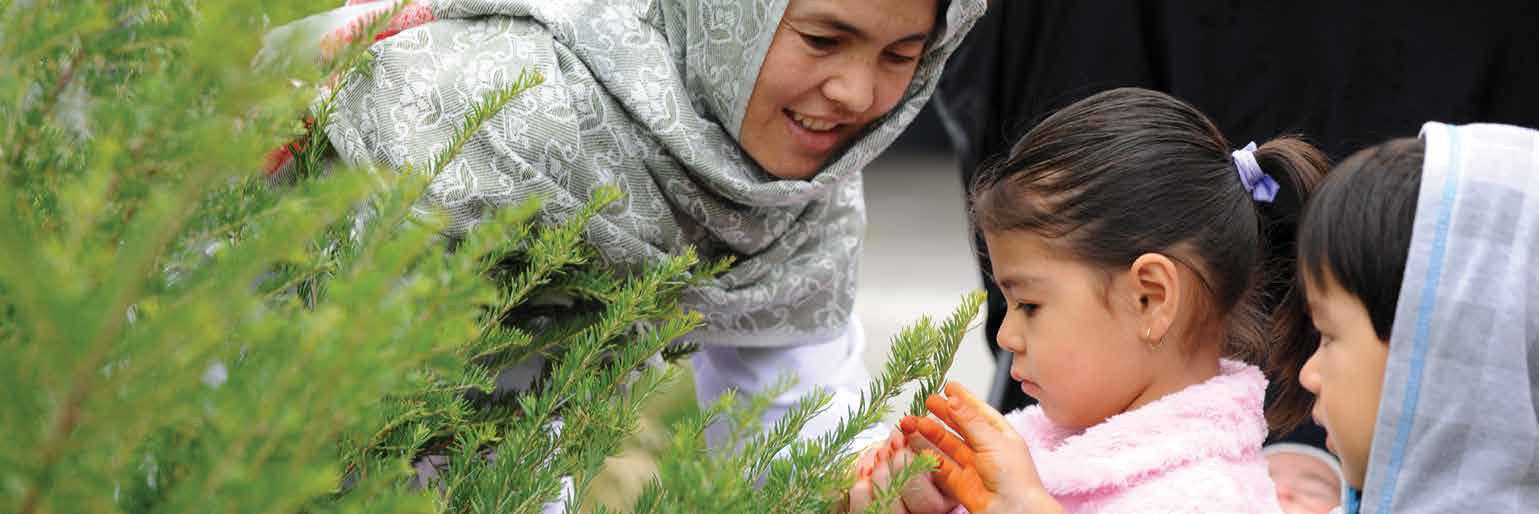Environmental activities
Playing together
Taking the time to look at the world with children shows them that you value them and their interests.

Activity
Learning happens in the everyday — especially since playgroup leaders don’t have much planning and preparation time.
When parents/carers and playgroup leaders are following their child’s lead, and watching to see what interests them, incidental environmental experiences may pop up.
Parents/carers may find their child looking at the clouds rolling by, puddle son the ground, or their shadow chasing after them.
Noticing these interests, talking and wondering about them, builds on children’s curiosity, and understanding of their world, and their place in it.
Parents/carers can keep near to their child, then watch and wait to see what interests them.
What you'll need
- Clouds
- Shadows
- Puddles
- Rain
- Insects
- Leaves, flowers, sticks etc
- Trucks/cars going past
- Birds
- Wind moving the trees
- Sounds (school bell, horns, sirens)
- Print signs, posters
- Magnifying glass
- Camera
Words to use
- Descriptive language – sky, cloud, fluffy, grey, stormy, light, heavy, dark, gloomy
- Look, see, wait, watch
- One, more, many
- Same, different
- Emotional language they see – fun, excited, happy, smiling, worried, pleased, interested, concentrating
Questions to discuss
- What can you see?
- What can you hear?
- What have you found?
Learning through play
Ways to develop numeracy through play
- Directional language – up/down, behind/over, North, South, East, West, high/low, near/far.
- Talk about time – speed of the clouds, how long it takes for a puddle to dry in the sun, how long it has been raining for.
- Collections – collecting leaves, stones, and other bits and pieces to sort and organise.
Ways to develop literacy through play
- Talking with children helps them build their vocabulary.
- Having a large vocabulary helps children communicate with others as well as being beneficial when first starting reading.
- Talking and wondering about their environment can build children’s understanding of how things work, and their relationship with it.
Extensions and variations to this activity
- Encourage outdoor play to increase the likelihood of ‘incidental environmental play’. Go on a walk with the children, asking them to call out what they can see, hear, smell along the way.
- Find a book about the topic either at home or at the library.
- Research questions on the internet if you don’t know the answer.
- Ask someone else what they know about it – “Our neighbour loves gardening, I wonder if he knows about this insect.” (or leaf, etc).
- Search for different kinds of leaves, insects, shadows etc, then compare them.
- Look for them again on a different day – “Do the clouds look different today?” “Do you have a shadow today?”
- Keep noticing what the children are drawn to and build on those interests.
Supporting parent engagement in play
Parents or carers can:
- Comment on what their children are doing (say what they see).
- Talk in their home language.
- Use literacy and numeracy words (see words to use section above).
- Watch their child to see when their child may need support.
- Comment on what they notice the child exploring – “Oh, you found some leaves! You are seeing how they crunch and crumble in your hand.”
- Extend the child’s interest in their find, by talking to them about it – “I wonder what might happen next...” “Do you have any ideas about what the ants are doing?”
- Extend the child’s interest by adding some sensory words – squish, squelch, slop, or commenting on how the child may be feeling – “You laugh when you try to escape your shadow! You are so excited!”
- Help children to extend their ideas by providing a basket for collections, a camera for a photo, or taking them to the library to find more information.
You can help families by:
- Modelling what you want them to do.
- Talking to them about the focus of the activity and what children might be learning.
- Writing up words that go with the activity.
- Making suggestions on what families can do at home.
Related Great Start activities
Great Start activities are for parents and carers to do with their children.


